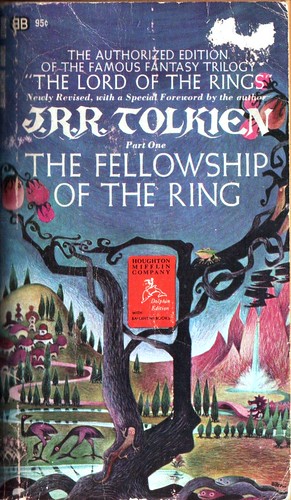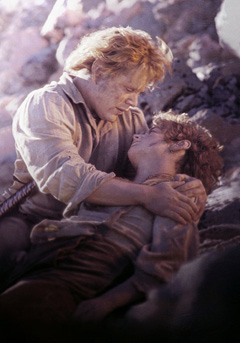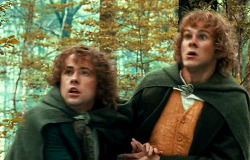I had a friend in high school who claimed to have read J.R.R. Tolkien's Lord of the Rings trilogy straight through 38 times (for a fast reader, that would take 2 hours per day, every day, for 5 years). I barely made it through once, with lots of skimming, , but I returned to certain passages over and over again. They were "good beyond hope."
A company of men. Working together, fighting, rescuing each other, hugging, saving the world.
Heterosexual desire almost absent: Tom Bombadil is devoted to Goldberry, the Ents pine away for the Entwives, Aragorn pines for Arwen (though not as much as in the movie series), and a few poems and songs say things like "Little Princess Mee -- Lovely was she," but nobody read them anyway.
And lots of same-sex romance.
1. Everyone today sees a romance between Frodo and Sam, especially as portrayed by Elijah Wood and Sean Astin in the movie series. But I didn't see it. Tolkien was highly class conscious, and Frodo and Sam are master and devoted servant. At the end of the story, Frodo goes to the Undying Lands by himself, and Sam goes home to his wife.
But I did notice that Frodo is gay. He surrounds himself with men and never once mentions a woman. (He reveres Galadriel, but as a goddess to be worshipped, not as an object of desire).
2. Merry and Pippin (played by Dominic Monaghan and Billy Boyd in the movie) are devoted to each other. They go through deadly danger for each other, and when they are split up, each pines for the other. After the War of the Ring, they go to work for Aragorn, so they can stay together forever.
After the War of the Rings, when Legolas goes to the Undying Lands, Gimli comes with him. Tolkien comments:
It is strange that a Dwarf should be willing to leave Middle Earth for any love, or that the Eldar (Elvish Gods) should receive him, or that the Lords of the West should permit it. . .More cannot be said about this matter.
This is a curious way to end the discussion, suggesting not that Tolkien has no more information on the subject (of course he does, he wrote the books and he could invent any information he wanted), but that he is forbidden from saying more. What is forbidding him? It seems that, in attempting to understand Legolas and Gimli, their love for each other, and their motive for forsaking Middle Earth together, Tolkien is drawing dangerously close to acknowledging a love that he dare not acknowledge, and he abruptly forbids himself from considering the matter further.



Maybe it was the casting of the movie but their was plenty of gay subtext- Frodo and Sam of course but also Arargorn and Legolas
ReplyDelete